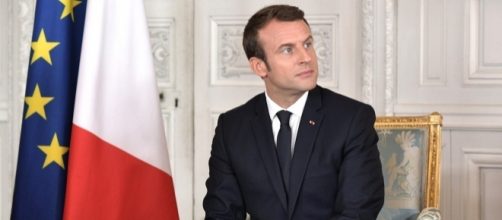What a beginning it was for President Macron and what a future it was to be for France. At only thirty-nine he was one of the youngest leaders of a major economy to be elected in the world. Involved in lower level politics and that only since 2012, Macron had not had the time to be corrupted, scandalised or jaded by the realities of political machinations.
He got his chance because France had finally had enough of the two mainstream parties. They could not even get a candidate into the final two in the runoff for President, the first time that had happened in most people's memory.
In that runoff, Macron faced Marine LePen leader of the far-right National Front. That she had come so far spoke volumes for French disgust with the mainstream, but she was still a bridge too far for most people. Thus Macron and his En Marche! (On the Move) party won with a healthy majority. A new beginning? Well, not so much!
The decline and fall of Macron?
After his first three months in office (his victory was won in May 2017 where he had an approval rating of 62%), the following has happened:
- His popularity has fallen further and faster than that of any other recent French President, as he prepares to push through hotly contested labour reforms. More than half of French voters (57% ) are dissatisfied.
- There is discontent over delays in promised tax cuts.
- Protests have forced him to scrap a plan to give his wife a constitutional role as First Lady.
- An Ifop poll showed only 40% approve of his performance, a 14% plunge since July, with another poll placing his rating as low as 36%.
- Unions and leftist groups have held the first protest against his controversial reforms to make French companies more competitive by liberalising France’s rigid employment code. The far-left leader, Jean-Luc Mélenchon urged his supporters to “take the struggle to the streets.”
The Republic is full of unrest at home, my what a short honeymoon that was!
Just as controversial is his position of whole-hearted support for the EU. He is one of the few leaders of countries (as opposed to self-serving EU bureaucrats) who sees deeper political and financial integration as the way forward. This goes against the right-wing parties in many countries (including France) who have thrived in the polls recently because so many people fear a United States of Europe. Few politicians through Europe seem able to convince the majority of voters who are deeply critical of the EU that its benefits extend beyond a few at the top with their noses in the trough.
Macron has triggered a diplomatic crisis abroad with Poland and other Eastern EU countries, over his demands for a change in EU labour rules to prevent central and east European workers from undercutting French workers when posted temporarily to France because they are exempt from its high payroll taxes.
He has also alienated the UK by demanding the EU stick to a hard line negotiation position regarding Brexit to protect his European dream.
The hoped-for road to salvation seems more likely to prove to be the road to perdition
Hellish so far and it looks to get no better. Removing rights from French workers, even though it is obviously needed if France is to compete internationally, is one of the toughest jobs in the world and has seen the political career destruction of far more experienced and ruthless politicians than Emmanuel Macron. Achieving the political and financial integration within Europe is almost certainly impossible, the stubborn attempting of it has seen the EU already well on the way to destruction.
People love their own countries far too much to ever let it happen and as Junker, Tusk, Barnier and co have found out, you can't silence all the people for all of the time, however much you determine to do so.
France is one of the greatest countries in the world. The sixth largest economy in terms of Gross Domestic Product, the third largest contributor to NATO, with a permanent seat on the Security Council; but it is in decline and it has been for many years. The Conservative Sarkozy was an extremely unpopular President (2007-2012) surrounded by scandal. Hollande the Socialist who followed him (2012-2017) did the impossible and left power even more unpopular than Sarkozy. He was so disliked he did not even run for re-election this time!
Mélenchon is an extreme left-wing firebrand who would make France's industrial problems far worse to the point of risking bankrupting the country and LePen's National Front are still struggling to shrug off the blatantly racist legacy of her father the previous leader Jean-Marie LePen.
Charismatic political giants needed urgently
Macron gained power largely because he was none of the above, but being President of a great country requires far more than that. His two policies of conviction, a closer Europe and reasonable employment laws will set against him many people who will fight like lions to prevent him succeeding.
As Charles Dickens so brilliantly displayed in the classic novel Bleak House, it is always sad to see youth and hope fade.
It happened with JFK brutally, to Obama through watching his growing limitations present themselves in America. To Blair in the UK when the mask slipped and to Hugo Chavez when the realities of Socialism destroyed the country as well as his vision in Venezuela, just before he died. It is happening to Macron as well and very quickly.
The answers for France are still to be searched for, but it seems they are not En Marche or Emmanuel Macron. France like the UK and Germany, the other two leaders of the continent, need a charismatic political giant. All three countries are finding those to be in very short supply indeed!


